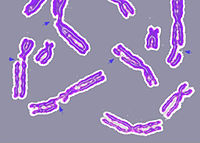
Photo from wikipedia
BackgroundMismatch repair (MMR)-deficiency increases the risk of colorectal tumorigenesis. To determine whether the tumors develop on a normal or disturbed epigenetic background and how radiation affects this, we quantified genome-wide… Click to show full abstract
BackgroundMismatch repair (MMR)-deficiency increases the risk of colorectal tumorigenesis. To determine whether the tumors develop on a normal or disturbed epigenetic background and how radiation affects this, we quantified genome-wide histone H3 methylation profiles in macroscopic normal intestinal tissue of young radiated and untreated MMR-deficient VCMsh2LoxP/LoxP (Msh2−/−) mice months before tumor onset.ResultsHistone H3 methylation increases in Msh2−/− compared to control Msh2+/+ mice. Activating H3K4me3 and H3K36me3 histone marks frequently accumulate at genes that are H3K27me3 or H3K4me3 modified in Msh2+/+ mice, respectively. The genes recruiting H3K36me3 enrich in gene sets associated with DNA repair, RNA processing, and ribosome biogenesis that become transcriptionally upregulated in the developing tumors. A similar epigenetic effect is present in Msh2+/+ mice 4 weeks after a single-radiation hit, whereas radiation of Msh2−/− mice left their histone methylation profiles almost unchanged.ConclusionsMMR deficiency results in genome-wide changes in histone H3 methylation profiles preceding tumor development. Similar changes constitute a persistent epigenetic signature of radiation-induced DNA damage.
Journal Title: Clinical Epigenetics
Year Published: 2019
Link to full text (if available)
Share on Social Media: Sign Up to like & get
recommendations!